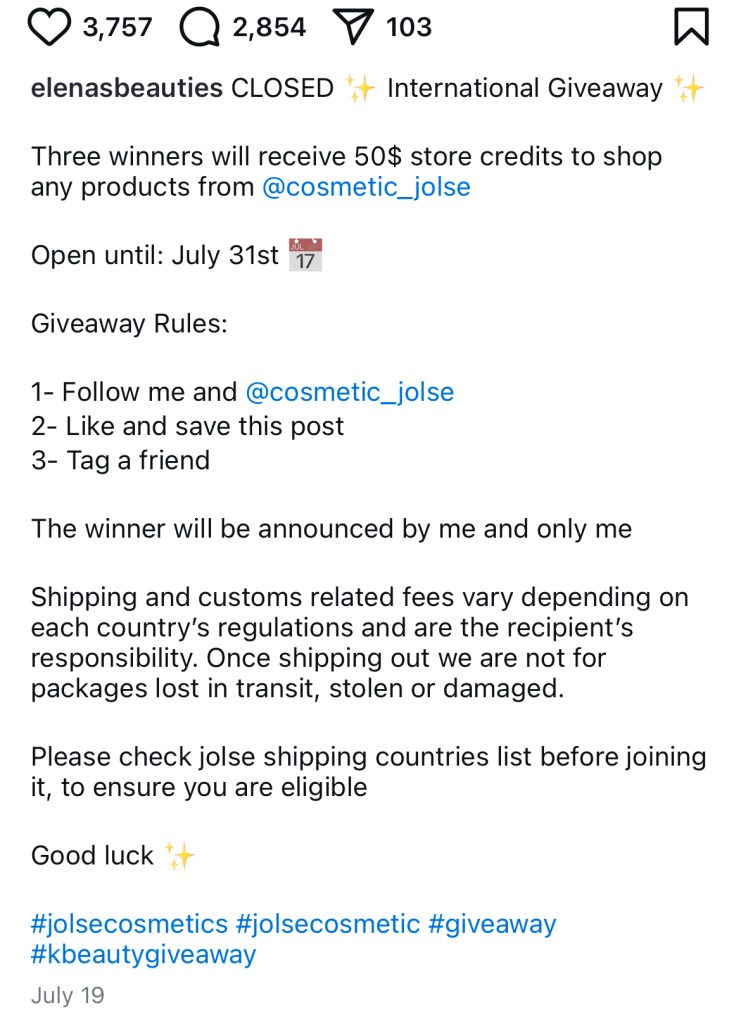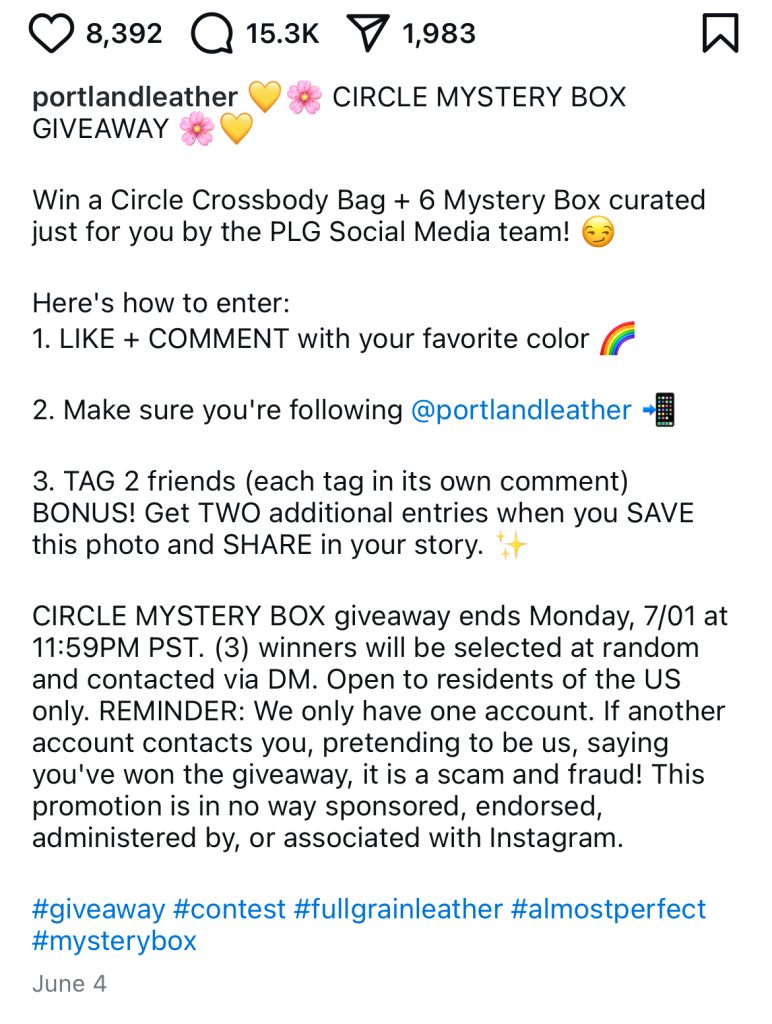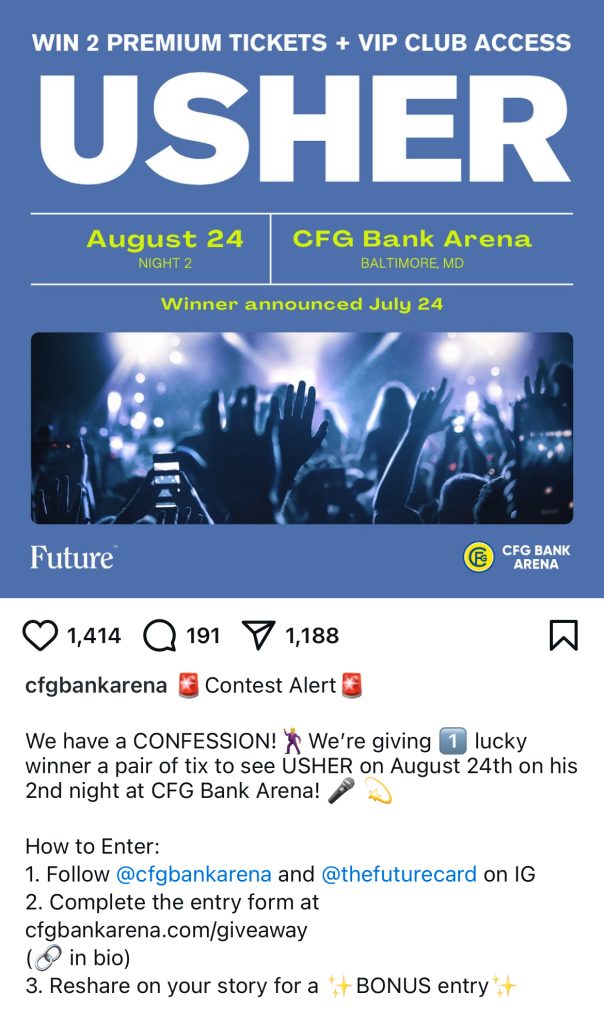How to Host Social Media Contests or Giveaways

Social media contests effectively engage audiences and boost brand visibility by encouraging interaction through activities like liking, sharing, or commenting. These contests can take various forms and offer different unique prizes. By leveraging social media and an attractive prize, brands can expand their reach and gain insights into consumer preferences and analytics, aiding in marketing strategy refinement.
Below, you’ll find a guide on how to run your own social media contest, complete with step-by-step instructions to maximize its effectiveness. If you’re unsure where to begin, we also provide common contest and giveaway ideas to inspire your creativity. Whether you’re a brand, influencer, or business, hosting a social media contest is an excellent way to grow your online presence.
What are the Goals of Contests on Social Media?
A social media contest is a dynamic way to engage users by offering a prize—often a product or service—in exchange for specific actions, such as commenting, sharing, or filling out a form. For example, you might announce a contest on Instagram or Facebook, inviting followers to comment with a heart or tag friends for a chance to win a dream trip. Once the contest period concludes, you draw and announce the lucky winner.
Social media contests serve multiple purposes for brands and individuals alike:
- Enhance Engagement: By encouraging comments or shares, you significantly boost your account’s engagement metrics.
- Improve Brand Awareness: Asking participants to tag friends in their comments can introduce your brand to new audiences, expanding your reach.
- Increase Brand Recognition: When users share your posts, your brand gains visibility beyond your immediate followers, attracting a wider audience.
How to Run a Social Media Contest or Giveaway
1. Set Your Goals
Your social media contest should include clear goals for your account or brand. This helps you tailor your strategy accordingly. Common goals include:
- Increase Followers: Structure your contest to require participants to follow your account, boosting your follower count and encouraging tagging of friends for wider reach.
- Boost Engagement: Create interactive contests that encourage comments, shares, or user-generated content, enhancing visibility and community interaction.
- Generate Leads: Require email addresses for entry to build your email list, allowing for follow-up marketing. Offering relevant prizes can further incentivize participation.
- Increase Brand Awareness: Design contests that promote sharing, such as asking participants to share posts or tag friends. Collaborating with influencers can also expand your audience.
- Drive Traffic to Your Website: Include a call-to-action that directs participants to your website, helping to showcase your products while increasing site traffic.
2. Choose the Right Platform
Selecting the right social media platform is important for reaching your target audience.
Consider the demographics of your audience and the content styles that each platform supports, so they align with your contest goals. Additionally, remember that each platform has its own contest rules. For instance, Facebook and Instagram require you to disclose that the contest is not sponsored by them, while X (Twitter) discourages the use of multiple accounts and duplicate tweets. Familiarize yourself with these guidelines to remain compliant.
Some of the most popular platforms for social media contests are:
- Instagram: The best platform for visual content. It can be particularly effective for contests that involve user-generated content (UGC) such as photo or video submissions. It is especially suited for brands in the fashion, food, travel, and lifestyle sectors. To maximize engagement, ensure you use high-quality images and provide clear calls to action.
- Facebook: Facebook offers versatility and caters to a wide demographic, making it suitable for various contest types, from simple like-and-share contests to more complex user submissions. It effectively drives traffic to websites and fosters community building through events and groups.
- X (Twitter): Designed for quick interactions and is best for contests that encourage engagement through retweets, hashtags, or mentions. It is an excellent platform for increasing brand awareness among a tech-savvy audience, focusing on simplicity and immediacy.
- TikTok: Perfect for engaging younger audiences with creative video contests that encourage users to create and share short clips. The platform’s algorithm favors content that garners high engagement quickly, so contests should be designed to go viral by leveraging popular challenges or trends.
- Threads: Meta’s latest social media platform is best for text-based interactions and fostering community discussions. It is suitable for contests that focus on storytelling or sharing experiences related to your brand.
- YouTube: Ideal for in-depth video content and is best for contests that involve storytelling or demonstrations. It works well for brands capable of producing high-quality videos and can drive significant traffic and engagement, especially when paired with influencer collaborations.
3. Familiarize Yourself with Local Regulations
Understand and comply with local laws before launching a contest. Different regions have specific legal requirements and adhering to these laws helps avoid issues and maintains your brand’s credibility.
These may include:
- Age Restrictions: Ensure contest rules specify any age requirements, especially for prizes unsuitable for minors, like alcohol.
- Necessary Disclosures: Clearly outline prize details, entry methods, odds of winning, and any costs to maintain transparency.
- Official Rules and Terms: Draft comprehensive rules covering all contest aspects to prevent misunderstandings and disputes.
- Permits and Registrations: Check if permits or registrations are needed, particularly for high-value prizes.
- Privacy and Data Protection: Comply with data protection laws like GDPR, detailing how participant information will be used and stored.
- Tax Implications: Be aware of tax responsibilities for both your brand and winners, and inform them accordingly.
4. Pinpoint Your Budget and Prizes
Your budget should encompass all costs, including the prize, promotional expenses, and any additional fees like advertising or contest management tools.
Allocating funds for promotion is particularly important to increase participation and engagement by reaching a wider audience. This helps prevent overspending and ensures efficient resource allocation for a smooth contest.
Your chosen prize serves as the main incentive for participation. It should resonate with your target audience and align with your brand values, whether it’s a product, cash, or an experience. For example, a travel voucher for a brand in the travel industry, or a skincare basket for a contest run by a skincare brand.
The perceived value of the prize should be significant enough to motivate participants to engage with the contest. By selecting an enticing prize, you can boost participation rates and enhance overall brand engagement.
5. Plan and Create Contest Rules
Crafting clear and comprehensive contest rules is a cornerstone of a successful social media contest. Well-defined rules not only guide participants on how to enter but also establish the framework for the contest, preventing misunderstandings and disputes.
Start by detailing how participants can enter the contest. Clearly specify the steps they need to follow. The more simple and transparent, the more likely your audience is to participate. Some common entry requirements include:
- Liking a post
- Sharing content
- Commenting
- Tagging friends
- Submitting user-generated content
From there, remember to include the following information:
✅ Define Eligibility Requirements: Clearly outline who can participate, including age or geographic limitations, and other criteria to manage expectations and prevent disputes.
✅ Specify Contest Duration: State the start and end dates of the contest, including the time zone. Include key milestones, such as entry reviews and winner announcements, to create urgency and encourage participation.
✅ Include Prize Details: Provide clear descriptions of the prizes, including their value and any conditions for winning. Ensure participants understand what they are competing for and how to claim their prizes.
✅ Address Legal and Liability Considerations: Include necessary legal disclaimers, such as stating that the contest is not affiliated with the social media platform. Consider adding a liability waiver to protect your brand from claims related to the contest.
✅ Make Rules Easily Accessible: Make the contest rules easy to find, either through a dedicated post on your website or pinned on your social media profile. This fosters trust and transparency with participants.
6. Promote Your Contest
Use various channels to promote your contest, including social media, email newsletters, and your website.
Start with social media by creating eye-catching posts that clearly highlight the contest details. Use vibrant images or videos that align with your brand to capture attention, boost brand awareness, and encourage shares. Incorporate relevant hashtags to enhance visibility. Depending on your budget, decide whether to rely on organic engagement or invest in advertising to attract more users to your contest.
You can also consider extending your promotion beyond social media. Send email newsletters to inform your subscribers about the contest and include a compelling call to action that directs them to participate. If you’re directing social media users to a specific landing page, ensure it contains all necessary information, including rules and entry methods, and is easily accessible with a user-friendly design for both mobile and desktop devices.
7. Monitor Engagement
Once the contest is live, keep track of entries and engagement. These metrics help you gauge the contest’s performance and assess the effectiveness of your promotional strategies.
Utilize analytics tools from social media platforms and your website to gather important data. Depending on the goals you outlined for the contest these key metrics may include:
- Number of entries
- Shares and comments
- Overall interaction and engagement rates
- Increase in followers
- Click through rate
Remember to keep interest in your contest going by regularly posting updates and key milestones. Post reminders before the entrance deadline, create a countdown for when you’re going to choose the contest winner, and make sure to publicly announce the winner and thank everyone for contributing.
8. Pick and Announce the Winner
Once your contest is done, it’s time to select the winner based on the criteria you set earlier. The easiest way to do this is by using a random generator tool, which can easily go through likes and comments on your contest post to ensure a fair selection.
💡 Hint: Consider going Live on video during the winner selection. This can create excitement among your audience while also maintaining transparency in the random selection process.
After choosing the winner, announce it publicly on the platform and reach out to the winner privately via direct message. This approach both celebrates the winner and also maintains transparency. Remember to thank all participants and encourage them to stay engaged with your brand for future contests.
9. Evaluate Results
After your contest, evaluate its performance against the goals you had set. This will provide valuable insights into what worked well and what areas may need improvement for future contests.
Analyze metrics like engagement, follower growth, and conversions and compare how each metric changed before, during, and after the contest. Identify which strategies were most effective and which ones didn’t perform as well. For example, if you wanted a certain number of entries but didn’t reach it, consider what changes could be made in your promotional approach or prize offerings next time.
Social Media Contest Ideas
Partnership
Collaborating with another brand or influencer can greatly expand the reach of your contest. By joining forces, you can leverage each other’s audiences, resulting in a larger prize pool and increased excitement. This strategy works particularly well when both brands target similar demographics, as it maximizes exposure and engagement.

For instance, a beauty brand might partner with a well-known makeup influencer to co-host a giveaway, as their audiences align closely. To enhance participation, consider making following both accounts one of the entry requirements. This approach not only boosts visibility for both brands but also fosters a sense of community among participants.
Voucher or Credits
Offering vouchers or credits as prizes can be a great way to drive sales and increase brand loyalty. Participants may receive a discount code or store credit, encouraging them to make a purchase. This type of prize is particularly effective for brands looking to boost conversions, as it incentivizes participants to engage with the brand beyond the contest itself.

Mystery Box
A mystery box giveaway adds an element of surprise and excitement, enticing participants with the unknown. This type of contest can generate significant interest, as people are curious about what the box might contain. It’s a fun way to showcase a variety of your products and can lead to increased engagement and shares as participants speculate about the contents.

Experience
Offering an experience as a prize, such as a workshop, concert tickets, or a behind-the-scenes tour, can create a memorable connection with your brand. Experiences are often perceived as more valuable than physical products, making them highly attractive prizes. This type of contest can also foster a deeper emotional connection with your audience, as they associate your brand with a unique and enjoyable experience.

Holiday or Vacation
A trip or vacation giveaway is a powerful way to capture attention and drive participation. These high-value prizes can generate extensive reach and engagement, as they offer participants the chance to win an unforgettable experience. To maximize the effectiveness of this contest type, ensure the destination or experience aligns with your brand and appeals to your target audience.

Design Contest
A social media design contest is a promotional strategy that invites participants to create and submit their own designs based on a specific theme or brand. This type of contest not only encourages creative engagement from users but also generates user-generated content (UGC) that brands can utilize for marketing, enhancing their visibility.

Design contests also foster a sense of community among participants, as they share their creative work and support one another throughout the process. To further encourage engagement and track submissions, consider creating a unique hashtag. This allows participants to easily share their designs and interact with each other, making the contest more dynamic and inclusive.
Social Media Contest Tips: How to Maximize Responses
Running a successful contest requires more than just offering a prize; it’s about creating a fun and engaging experience for your audience. Here are six tips to ensure your contest delivers great results:
1. Understand Your Target Audience
To run an effective contest, you need to know who you’re targeting. Tailor your contest to a specific audience, rather than trying to appeal to everyone. Think about their interests, whether they’re new or existing customers, and what you’re promoting. This will help shape the contest and make sure it resonates with the right people.
2. Choose the Right Budget and Prizes
Ensure the value of the prize matches the effort required for entry. The prize should excite your audience and fit within your budget. A more valuable prize might bring in more participants, but it must be sustainable for your business.
3. Make Participation Fun
While a great prize is key, making the process fun is equally important. Whether it’s a caption contest or a challenge, engaging your audience creatively keeps them invested and more likely to participate. Consider offering a small reward just for entering, like a discount code.
4. Use Hashtags Effectively
Using hashtags effectively can significantly increase the visibility and reach of your social media contest. By creating a unique, branded hashtag, that is simple, memorable, and relevant, you can easily track entries, consolidate related posts, and make it easier for participants to engage. Encourage participants to use the hashtag in their posts to promote the contest to their networks organically. When used strategically, hashtags can drive engagement and boost your contest’s visibility.
5. Leverage User-Generated Content (UGC)
Encourage participants to create and share content related to your brand. UGC not only boosts engagement but also broadens your reach, as people share their entries with their followers. The more people see their friends entering, the more likely they are to join in too.
6. Follow Up After the Contest
A contest shouldn’t end when the winner is announced. Follow up with participants through personalized messages or promotions to keep them engaged with your brand. This can include email marketing, offering exclusive discounts, or new product announcements.
Manage Your Social Media with Metricool
Create and publish content, analyze metrics, and optimize your social media strategy.

